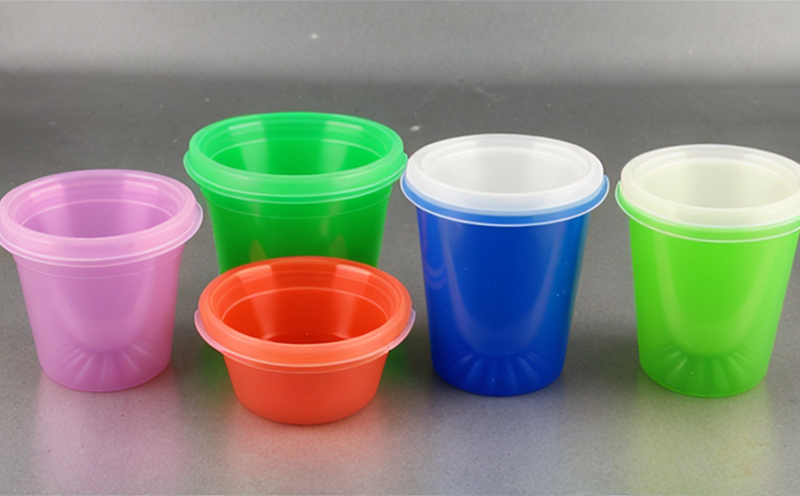ISO 15380 Biodegradable Disposable Plastics Testing
The ISO 15380 standard provides a comprehensive framework for evaluating the biodegradability of disposable plastics, ensuring compliance with environmental regulations and sustainability goals. This testing is essential for manufacturers aiming to offer eco-friendly products that do not contribute to long-term pollution in landfills or oceans.
Biodegradable plastics are designed to decompose under natural conditions through biological processes. However, the efficiency of their degradation can vary significantly depending on various factors such as temperature, moisture content, and microbial activity. ISO 15380 specifically addresses these variables by standardizing the testing methodology.
The test involves subjecting the plastic samples to controlled environments that mimic real-world conditions where biodegradation is expected to occur. These include soil incubation tests conducted at specific temperatures (typically between 55°C and 65°C) and under aerobic or anaerobic conditions, depending on the type of degradation desired.
For accurate results, samples are prepared according to strict guidelines provided in ISO 15380. This includes precise cutting dimensions and ensuring uniformity among all test specimens. Specimens must be placed into predefined soil mixtures or other substrates where they will undergo biodegradation over a specified period (usually up to 24 months).
The testing process measures various parameters including weight loss, mass loss, and reduction in chemical composition, which indicate the extent of degradation. Additionally, microorganisms involved in the decomposition process are also analyzed to ensure that the observed changes are indeed due to biological activity.
Once completed, detailed reports are generated summarizing all findings based on ISO 15380 criteria. These reports serve as crucial documentation for regulatory compliance and internal quality assurance purposes. They help manufacturers demonstrate their commitment to sustainable practices while maintaining product performance standards.
In conclusion, ISO 15380 biodegradable disposable plastics testing plays a pivotal role in advancing the development of environmentally friendly products. By adhering strictly to this international standard, companies can ensure that their offerings meet both regulatory requirements and consumer expectations regarding ecological responsibility.
Benefits
Adopting ISO 15380 biodegradable disposable plastics testing offers numerous advantages to organizations across different sectors, particularly those focused on sustainability initiatives. One key benefit is enhanced credibility and reputation among environmentally conscious consumers who seek out products that align with green values.
Another significant advantage lies in regulatory compliance. Many governments worldwide are implementing stringent laws requiring manufacturers to prove the biodegradability of their plastics before they can be sold commercially. By undergoing ISO 15380 testing, companies avoid potential legal issues and penalties associated with non-compliance.
The test also facilitates innovation within R&D departments by providing valuable insights into material performance under diverse environmental conditions. Engineers can use these results to refine existing formulas or develop entirely new biodegradable compounds tailored specifically for targeted applications like single-use containers, packaging materials, etc.
Furthermore, successful completion of ISO 15380 testing opens up market opportunities in regions with high demand for sustainable products. Companies that can confidently showcase their commitment to reducing waste contribute positively towards global efforts aimed at combating climate change and preserving natural resources.
Beyond these commercial benefits, there is an intrinsic satisfaction derived from contributing to a cleaner planet by ensuring that discarded plastic items do not persist indefinitely in ecosystems but instead break down into harmless components through natural processes.
Eurolab Advantages
At Eurolab, we pride ourselves on offering unparalleled expertise and state-of-the-art facilities dedicated to polymer & plastics testing. Our ISO 15380 biodegradable disposable plastics testing service stands out due to several unique advantages:
We employ highly trained technicians who possess deep knowledge of both theoretical principles and practical applications related to biodegradability assessments. They stay updated with the latest advancements in analytical techniques and methodologies, ensuring accuracy and reliability in every test conducted.
Our laboratories are equipped with cutting-edge instrumentation capable of detecting even minute changes during the decomposition process. This allows us to provide precise measurements that reflect true performance characteristics accurately.
We offer flexible scheduling options tailored to meet clients' specific needs, whether it's for routine monitoring or one-off projects requiring immediate attention. Efficient project management practices ensure timely delivery without compromising quality standards.
Confidentiality is paramount when dealing with sensitive information. At Eurolab, we adhere strictly to strict confidentiality agreements ensuring that all data remains secure and protected from unauthorized access.
Lastly, our commitment extends beyond just providing services; we also offer comprehensive support throughout the entire lifecycle of a product, from initial concept through final certification. This holistic approach ensures that clients receive value-added assistance beyond mere testing capabilities alone.
Why Choose This Test
Selecting ISO 15380 biodegradable disposable plastics testing is a strategic decision for any organization looking to enhance its environmental profile and ensure compliance with international standards. Here are some compelling reasons why this particular test should be prioritized:
Firstly, it provides an objective measure of how effectively your products contribute towards reducing environmental impact post-consumer use. Understanding these metrics helps identify areas for improvement or optimization in future iterations.
Secondly, compliance with ISO 15380 is increasingly becoming a prerequisite for market entry into many countries around the globe. Failing to meet these benchmarks could result in significant financial losses and reputational damage.
Thirdly, consumers are becoming more discerning regarding the environmental credentials of brands they support. Demonstrating robust adherence to recognized standards like ISO 15380 can significantly boost brand loyalty and foster trust among stakeholders.
Forthwith, obtaining certification from such rigorous tests demonstrates leadership in sustainability practices, positioning your company as a pioneer in eco-friendly innovations within your industry.
Finally, successful completion of this test not only satisfies regulatory bodies but also sets benchmarks for continuous improvement. Regular retesting ensures ongoing alignment with evolving standards and expectations.





